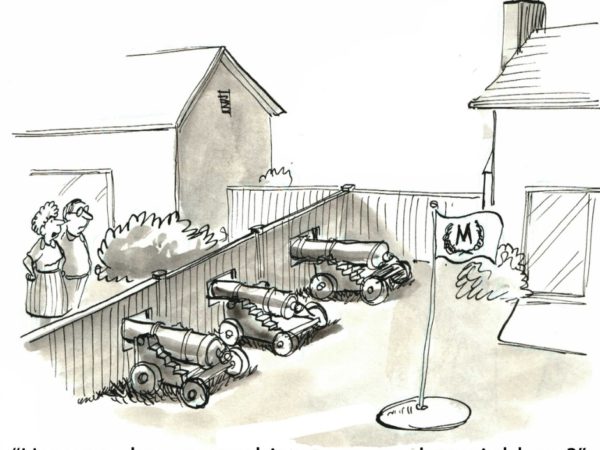In truth, those who are patient amid hardships and unjust treatment are fulfilling the Lord’s command: When struck on one cheek, they turn the other; when deprived of their coat, they offer their cloak also; when pressed into service for one mile, they go two [Matthew 5: 39-41]. (Rule of St. Benedict 7.42)
If you had to pick the craziest-sounding command of Jesus, “turn the other cheek” might win the prize. Second and third place go to offering extra goods to a thief and volunteering help to a bully.
But each of these scenarios involves a strictly limited sacrifice. You can walk two miles out of your way and still get home. You can give up two items of clothing and still make a living. A slap in the face is painful and insulting, but you can survive and go on. In no way do these instructions imply that we should stick around forever to be defrauded, enslaved or murdered.
No one has more than two cheeks, and the gospels don’t tell us what to do if, after getting a second chance, the attacker keeps on hitting.
Still, there’s a concept here. Like so many Christian concepts, a word exists for it in English but has fallen out of use. The command is: forbear.
Inherent in this word is the sense that the practice of its principle is hard. The Old English prefix “for” intensifies the verb “to bear.” It means to endure–specifically to suffer insult and injury while refraining from revenge.
Who can do it?
In fact some people in this world today are already enduring far more than Jesus asked. They cannot bear up because they have been crushed. Others are straining so hard against oppression that they expend all their strength just to keep their footing.
It’s the rest of us who have choices to make.
Sometimes you choose to walk away from friends who have sold out to trending evil.
If you have the power to stop an injustice, to stand idle is not forbearance but collusion. If you are responsible for other people, you must act in their best interest. Forbearance ends where duty begins. Sometimes duty requires that you act to oppose bad behavior.
Nor can you forbear on behalf of someone else. You bear up under your own suffering. You don’t glibly offer up another person to endure something that you yourself don’t have to worry about.
Forbearance is the restraint of strength, not the passive submission of weakness. In order to forbear, you must first realize that you could hit back. So think of a way to do it.
Then, instead, attempt to negotiate a solution. You hope that your example of restraint will give pause to the other person. After all, people can behave badly without being bad people. Perhaps they will reconsider and make an effort to do better. Instead of escalating the conflict, you give them another chance. You appeal to the good in them rather than fueling the bad.
Or you may hold back out of concern for someone else who is innocent and who would suffer as a result of your action. For the sake of the good person, you refrain from punishing the bad one. This is the forbearance that God extends to the whole world every day, as he continues to sustain the existence of those who do wrong, for the sake of those who do right.
There’s no privileged class of people who can bypass the righteousness of God. He will hold each person accountable individually. We can refrain from vengeance because he promises that he will establish justice in the end.
So it’s not only for this world’s life that we struggle. Yet we do struggle for life in this world. We refrain from vengeance, but we also work for justice. We manage to turn the other cheek, because we look over the shoulders of wicked people and see a new day dawning in which they have become irrelevant.
Your own dwelling is the greenhouse of the seedlings of hope. It’s at home that we learn to forbear. When a boy has had his juice spilled by his little sister–the juice he was going to take to school, and now there’s none left–and (after the initial howl of dismay) he tells you not to be mad at her, it was just an accident, and even, “I’ll clean it up”–then rejoice and be glad, because heaven has conquered in that moment.
Or perhaps a younger child destroys the possession of an older sibling. This is where the older one learns what grace is. Because restitution may be impossible. The child must let go the attachment to the destroyed object and extend mercy to the incompetent other, who not only cannot compensate for the loss but is not even reliably going to refrain from doing the same thing again. This is forbearance. It is brotherly love. A child who can forgive a brother or sister has come very far in the Christian life already.
When children begin to intercede on behalf of their siblings, so that you won’t be angry at the brother or sister, then you know that you’re in the presence of saints. They don’t think of themselves as saints. But their behavior is no less holy.
Forbearance is that moment when justice halts for the sake of peace. Truth holds its tongue for the sake of love. On a small scale, everyone regularly experiences something that feels unfair. When everyone learns to forbear, you will have a happy home.
Not wealthy homes but loving ones produce good people.




